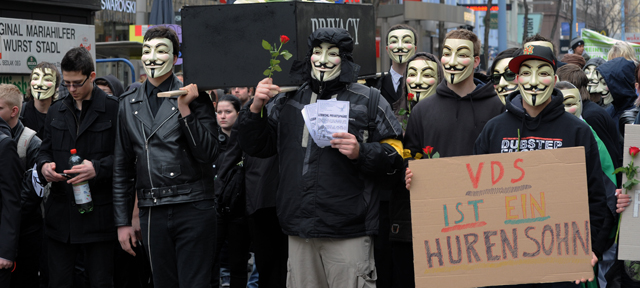
Saturday – April 31 2012 – Kawther Salam,
About three thousand Austrian protesters held a funeral March with prayers against the implementation of the “Data Retention Law” (Spying law) from the first of April 2012 in Austria. The demonstrators carried symbolic “Privacy” coffins to express their anger against the disrespect of the government for their privacy and personal data. The coffins were wrapped in black flags and in the Austrian and European flags.
The new law allows the state to spy on everybody by the storing all communications data of Internet, telephone and SMS connections of everybody in Austria. Under the law, which was foisted on the country by the EU and decided last year in the Parliament, the Internet and telephone service providers must store all connection data of all its customers for a period of six months. The data of each phone call, of every text message and every email, is stored – that is, who communicates and with whom, and where and when, without the need that there be any concrete suspicion.

During six months, the State (intelligence and internal security) has the right to look at the saved data and reach deep into the private communications of anybody. While the official line of the government is that this will only happen “when deemed necessary and by a judiciary decision”, the fact is that the latest “upgrade” of the law regulating police powers (Sicherheitspolizeigesetz) lets them do something called “preventive investigation”, what means that they can initiate surveillance on anybody without having to demonstrate probable cause of any kind and without the intervention of a judge or prosecutor.
For intelligence systems it is always “necessary” to spy on certain groups which naturally arouse their suspicion. These groups are normally people who look or behave different from what these authorities consider “normal”, and groups of people who are suspect because they could endanger the sitting powers – politically interested people, activists, journalists, certain lawyers, certain religious groups, and in general people who are “smarter than the police allows”.


































